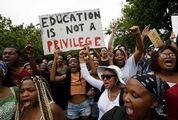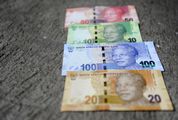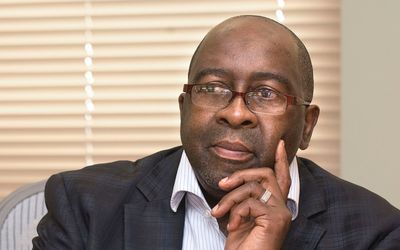A DAVID Sipress cartoon in the New Yorker perfectly captures the ambivalence many South Africans are experiencing. It depicts a woman walking down a street complaining to her partner: "My desire to be well-informed is currently at odds with my desire to remain sane."
Finance Minister Nhlanhla Nene does not enjoy the luxury of ignoring the bad news and has the worse task of reassuring skittish investors, restless comrades and sceptical rating agencies. He somehow has to conjure up the proverbial silk purse from the sow’s ear of public finances.
Nene has always projected an appearance of steadfast competence, a reality confirmed on closer acquaintance. Steeling himself for today’s medium-term budget policy statement in Parliament, though, even his reassuring composure must be sorely tested. He has to navigate between the red ink on our national balance sheet and the red-tide backwash from his party’s recent national general council talk-fest.
On the numbers front, official opposition finance spokesman David Maynier recently shared his figures with me. In his considered view, "they are deeply scary".
President Jacob Zuma’s excruciating difficulty in enunciating the declining number of his party members went, in this digital age, aptly viral to provide much-needed humour in dismal times. The national statistics, though, are no laughing matter.
The "perfect fiscal storm" of low growth, above-inflation public sector wage hikes and additional guarantees for state-owned enterprises draw much comment. However, the dire state of national indebtedness, cause and consequence of the sulphurous seas lapping against the doors of the Treasury, needs even greater scrutiny. And it’s cause for considerable alarm.
Net loan debt is projected to increase by R370bn from R1.78-trillion in 2015-16 to R2.15-trillion in 2017-18.
We are dangerously entering debt-trap territory, with debt-servicing costs projected to rise to R402bn — now the single largest item in the budget. In plain terms, we now spend double on repaying debt than we do on education. The cost of servicing this debt has increased more than 130% during Zuma’s presidency, from R54.4bn in 2008-09 to R126.4bn now.
It’s not just the numbers that suggest that we are heading for a car crash between financial sanity and ideological and policy overreach. It’s the profligacy of a near decade of debt-financed consumption expenditure that makes the necessary investment in capital projects to restore and modernise our creaking infrastructure and create shovel-ready real jobs nothing more than a mirage.
There was little sign of appreciation of our cramped, indeed disappearing, fiscal space in the resolutions that flew out of the African National Congress’s (ANC’s) national general council.
The bedrock of our domestic food security and waning contributor to our exports, large-scale commercial farming, will be upended by the proposal for giving up half of farm equity. If you’ve got a farm, sell it as soon as possible, is the message from this hare-brained scheme.
Then there was a proposal to "fast-track national health insurance" (NHI) by "encouraging the Treasury to ensure resources are available and NHI finances are finalised".
Just in case the reality presented in the Treasury’s numbers encourages naysaying sceptics to ventilate in public, another resolution takes care of this. The ANC, according to a report, "wants to deal with the negative way in which it is being portrayed in the media". A media appeals tribunal is just the ticket, according to minister Lindiwe Zulu, to address the problem of the "ANC being relegated either to the back pages or on the side of the negative".
Actually, there was one item of good news in the resolutions and that was yet another promise to "root out corruption".
But this apparent good news lasted all of about 48 hours. That was the distance in time between the council resolution and the judgment in the Northern Cape High Court convicting ANC Northern Cape chairman and MEC John Block of corruption and fraud. Not good enough for his premier, Sylvia Lucas, who announced, mystifyingly, that action would be considered against him only "after sentencing". There you have it: a court-mandated conviction is insufficient for action. How will she determine action thereafter? Is jail time only good enough, or will a hefty fine do?
But this story has, at least, a better ending than Lucas intended. By Friday, higher ANC councils had forced Block’s resignation, perhaps proof that, in this area, the party might, at last, walk its talk.
Another resolution of the national general council, to ditch our front-ranking status as a signatory state of the Rome Statute of the International Criminal Court confirmed the direction we have chosen. But West Africa’s powerhouse, Nigeria, is taking a very different tack.
Last year, it eclipsed SA as the continent’s largest economy. This year, in an event as profound as our 1994 election, it allowed the electorate to depose an incumbent president who then accepted the people’s verdict. New president Muhammadu Buhari has proven early on a determination to do things very differently from his woebegone predecessor, or the current signals emanating from our own ruling party.
He hasn’t resiled from his international commitments or accused the West of being in a giant conspiracy against his country. Instead, a week ago, his office declared it was "working very closely with British law enforcement", which had just arrested former oil minister Diezani Alison-Madueke.
He has vowed to hunt down those responsible for stealing funds from the fiscus, estimated to be more than $150bn.
While he has been slow with his cabinet appointments, he reassured the markets when he announced last week that the head of Nigeria’s biggest private equity firm, Okechukwu Enelameh, head of African Capital Alliance, and a former Goldman Sachs banker, would be one of his picks.
These early signals from West Africa’s powerhouse suggest not only renewal but a determination to shrug off Nigeria’s image as the poster boy for fiscal incontinence and pervasive corruption.
Imagine how the markets here and everywhere would react were Zuma to have chosen Brait’s Christo Wiese for the Cabinet, or former AngloGold CEO Bobby Godsell as his new minister of mineral resources. Instead, amid the biggest meltdown in our 100-plus years of mining history, Zuma plucked from provincial obscurity the Guptas’ best Free State friend, Mosebenzi Zwane.
Instead of complaining about how it is depicted, our government should start to generate, through deed and consequential decision-making, that it is on the right track and that the naysayers are wrong. Then being well-informed will no longer induce weary depression.
• Follow Leon on Twitter: @TonyLeonSA



























Change: -0.38%
Change: -0.42%
Change: -0.47%
Change: -0.49%
Change: 0.09%
Data supplied by Profile Data
Change: -0.46%
Change: -0.17%
Change: -0.42%
Change: 0.00%
Change: -0.12%
Data supplied by Profile Data
Change: -0.15%
Change: 0.15%
Change: -0.03%
Change: 0.09%
Change: -0.20%
Data supplied by Profile Data
Change: 0.28%
Change: -0.14%
Change: 0.07%
Change: -0.08%
Change: 0.13%
Data supplied by Profile Data